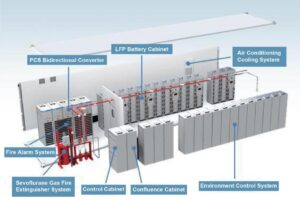What is Energy Storage Battery System
An energy storage battery system is a way to store electrical energy. These systems can be used by large-scale electric power producers to help them meet energy demands. These systems are usually in the form of a battery storage power station. These systems are a great way to reduce energy bills and are also beneficial for the environment.
A battery management system helps maintain battery performance and safety by collecting key data, such as single-voltage voltage, temperature, battery terminal voltage, and current. It is also designed to detect and manage over-charging and over-discharge conditions. It can also provide a short-circuit protection feature.
An energy storage battery system contains three types of equipment: an ECS, a BMS, and a PCS. The ECS protects the batteries, schedules their charging and discharging activities, and controls the BMS. The BMS is responsible for real-time monitoring of the system and controls the standby functions of the PCS. The ECS also monitors AC circuit breakers, fire protection, humidity sensors, and electricity meters.
A battery storage system is an effective way to maintain energy supply and demand in a large facility. The energy stored in the system can be used during periods of low electricity cost and can be sold to the grid when the price is higher. It can also support the integration of low-carbon technologies into the grid. As a result, the government of the United Kingdom estimates that battery storage systems will save PS40 billion by 2050.
Lithium batteries are highly durable and low maintenance. They have very low self-release rates and are sealed tightly to prevent moisture penetration. This makes them ideal for marine and aquatic applications. A good Energy Storage System Supplier will also provide a smart BMS to regulate power and voltage and maintain a safe environment.

Energy Storage Battery System
A battery management unit (BMU) is installed in the battery pack and monitors its status and other information. The BMU also accepts instructions from PCs. The BMU can also control the modules, charging them and discharging them automatically. This will enable the system to maximize its value to the grid and its customers.
Another benefit of an energy storage battery system is that it saves space. Because the battery lasts a long time, an Energy Storage System Supplier can provide the right battery for your needs. This type of energy storage system will pay off in the long run and is cost-effective. The right Energy Storage System Supplier should offer competitive prices, excellent performance, and long life.
In the future, the use of battery energy storage systems is expected to become a popular solution for utilities and businesses alike. With the rise of renewable energy, battery energy storage systems will be a key component in replacing nonrenewable sources of energy.
Lithium batteries are particularly safe to use, thanks to their low self-release rate. Lithium batteries are also well-sealed to prevent moisture penetration. They are particularly suitable for marine and aquatic applications. A good energy storage battery system supplier will always include a smart BMS to protect their battery system from overheating. If the temperature rises too high, the BMS will switch on the forced cooling system to prevent damage.